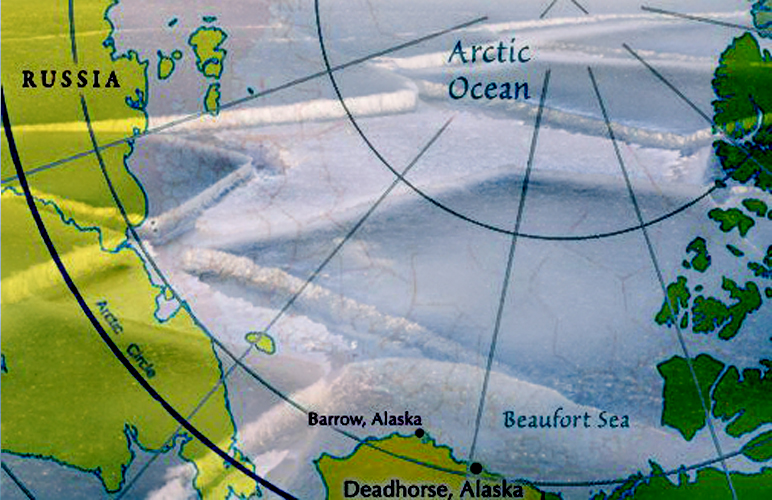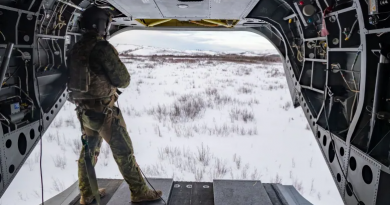Alaska calls for greater national involvement in melting Arctic
 As countries eye a vast array of untapped resources in the melting Arctic, an Alaska legislative task force wants the federal government to invest in new ice-breaking ships and the region’s first U.S. Coast Guard base.
As countries eye a vast array of untapped resources in the melting Arctic, an Alaska legislative task force wants the federal government to invest in new ice-breaking ships and the region’s first U.S. Coast Guard base.
Those are just some of the recommendations issued by the Alaska Northern Waters Task Force in a final report meant to help the state and U.S. “stake our ground,” as one member put it, in the international race to carve up resources in the once ice-locked region.
The Legislature created the panel in 2010 to dial it into changes happening in the Arctic.
Alaska’s Arctic woefully unprepared
One big change includes a sharp rise in the number of ships plying Alaskan coastal waters, especially through the Bering Strait. Cruise-ship tourism has grown, energy companies are studying underwater deposits, and Russian and European shippers are seeking a fast route to Far East markets.
Alaska’s Arctic is woefully unprepared for the extra visitors. The nearest U.S. Coast Guard base and rescue planes are hundreds of miles away. International ships traveling near Alaska aren’t required to report their presence to U.S. officials. Meantime, the region lacks sophisticated ship-tracking tools and designated lanes to separate vessels.
The report, issued after months of statewide meetings with communities and consultation with experts, says Alaska and the U.S. government must do more. The 10-member task force of lawmakers, government officials and others discovered “a race to the moon mentality,” as countries such as China and Russia build Arctic-hardy vessels while the U.S. trails behind, said Rep. Bryce Edgmon, D-Dillingham, an alternate board member speaking at a press conference on Thursday.
“We are not as prepared as we need to be and not as fully engaged as we should be,” he said.
Series of recommendations
Some recommendations from the task force will be presented as resolutions to the state Legislature and Congress. One resolution already sent to the U.S. Senate calls for the U.S. to ratify the United Nations Law of the Sea treaty, a move that would “help legitimize U.S. claims to offshore resources beyond the 200-mile Exclusive Economic Zone,” the report said.
Also, the Alaska Legislature should urge Congress to pay for new ice-breakers and support a U.S. Coast Guard base. And an Alaska Arctic commission must be created to develop a comprehensive strategy that helps protect local people and environments.
“Is Alaska going to take a back seat to its own future because other people decide?” asked member and Rep. Bob Herron, D-Bethel, at the press conference. “This summary and this report says no way.”
Other recommendations include:
The state, U.S., tribes and local governments should participate in international efforts to develop agreements for shipping, fisheries, oil and gas development. Also, the state should play a greater role in the Arctic Council, an intergovernmental forum addressing Arctic issues.
Additional resources are needed to improve charting and mapping by agencies such as the National Oceanic and Atmospheric Administration, particularly of coastal areas and harbor entrances to villages. Maritime hazards have been sparsely studied, and charts used by mariners showing such things as underwater sandbars are decades old. The state, U.S. and industry should work to improve oil-spill prevention and response plans in the region. Also, the University of Alaska should establish an oil spill research center.
Designated sea routes and better tracking are needed to help ships safely transit the Bering Strait and other areas. Also, the Automatic Identification System must be extended for vessel tracking to waters off Alaska and Canada.
Contingency plans must be required for ships traveling in Arctic waters, and the U.S. and state should work together and internationally to finalize the Polar Code. The code would establish ship guidelines for such things as safe speeds and emergency plans if no help is nearby.
The Aleutian Islands Risk Assessment, a multi-agency effort to make shipping safer in the Bering Sea and near the Aleutian Islands, must be completed. Also, the state should support and participate in the United States Coast Guard Port Access Route Study for the Bering Strait, to help create travel corridors in the area.
Contact Alex DeMarban at alex(at)alaskadispatch.com
For more stories from Alaska Dispatch, click here.



